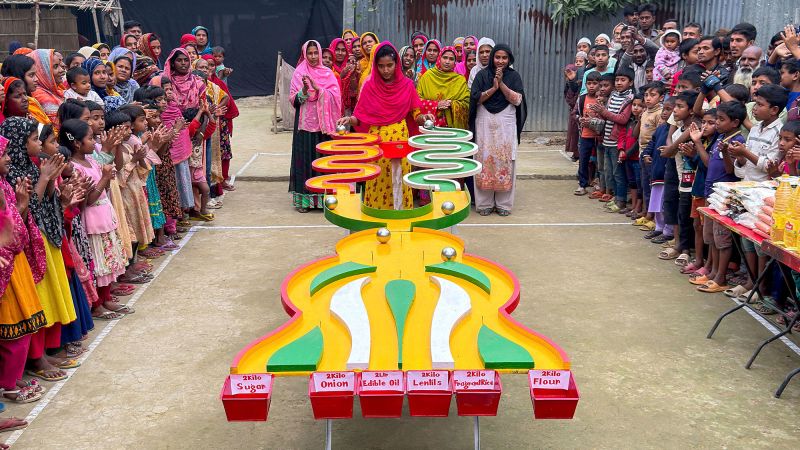Mohammad Abdur Rouf is a rice farmer from Chapra, a small village in Bangladesh. Each day before sunrise, he travels six miles to join hundreds of people in playing a carnival-style game developed by content creator Omar Sunny Somrat. Players like Abdur win essential food items like rice, oil, sugar, and lentils as prizes due to the rising cost of these staples. Despite the challenging nature of the game, Abdur beams with joy when he wins a modest prize, knowing it will benefit his family of nine.
The SS Food Challenge, inspired by iconic game shows like Takeshi’s Castle, has become a hit in Bangladesh. Players from all walks of life, many living in poverty, participate in the challenges to win basic necessities that inflation has made unaffordable. Somrat created the game two years ago in response to soaring commodity prices in the aftermath of global events like the Russian invasion of Ukraine. The World Bank predicts that food prices will remain high until the end of 2024, prompting more people to join the challenges to win food items.
Somrat’s online venture has garnered over 1.5 billion views and has millions of subscribers on various platforms. With a monthly revenue of $35,000 to $45,000 solely from online clicks and digital monetization, Somrat has been able to sustain a staff of 25 people and provide prizes for the challenges. Despite declining sponsorships, he continues to grow the game’s popularity with engaging content that resonates with the players. The success of the SS Food Challenge has enabled him to give back to the community while also generating income.
In response to the economic challenges faced by villagers in Bangladesh, particularly the rising cost of food items, Somrat’s decision to offer these essentials as rewards in the game has struck a chord with participants. As the Bangladeshi currency depreciated and food prices soared, more villagers began participating to win items that would help them make ends meet. The high inflation rate of 9% in 2022, the highest in 12 years, further incentivized villagers to take part in the challenges to secure essential food items as prizes, providing some relief in difficult times.
Inflation in Bangladesh was exacerbated by the pandemic-related supply chain issues and the impact of Russia’s invasion of Ukraine, particularly affecting emerging markets like Bangladesh. The country’s dependence on oil and wheat imports, coupled with the reduction of subsidies for essential commodities to secure international loans, added to the economic challenges faced by the population. Analysts predict a cooling of prices in 2024, offering hope for households like Asma Khatun, who can sustain her family with the winnings from the challenges. The popularity of the games has become a logistical challenge for Somrat, who now has to focus on crowd control to ensure a smooth and enjoyable experience for all participants.


